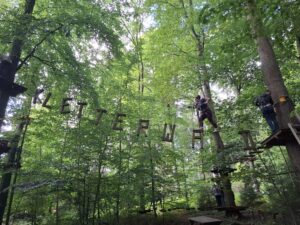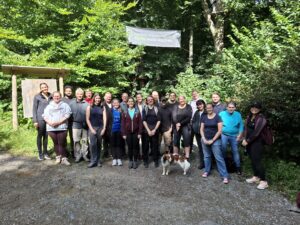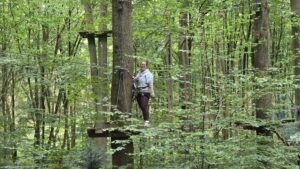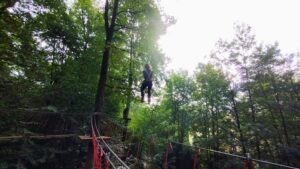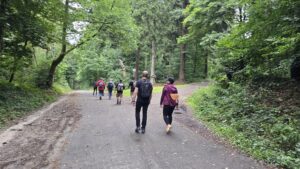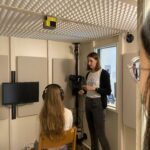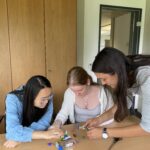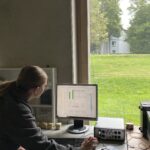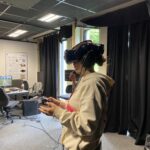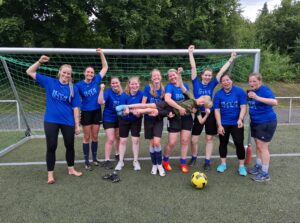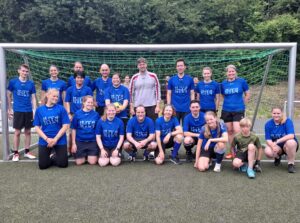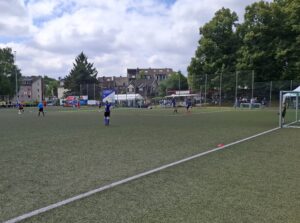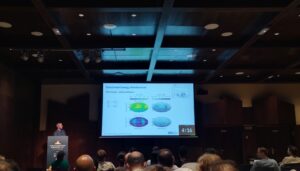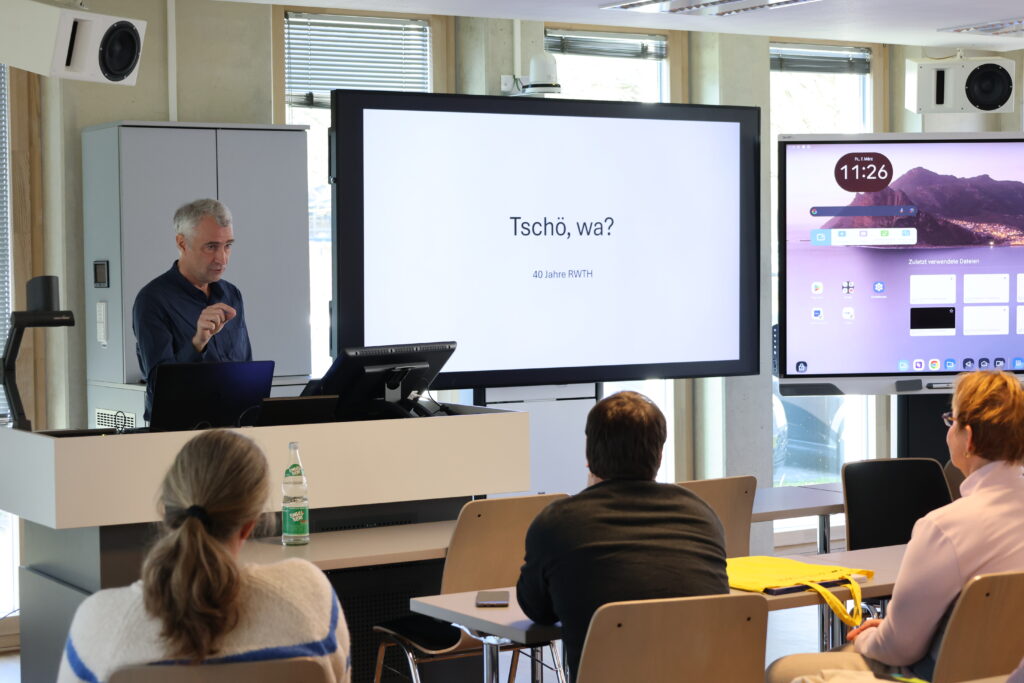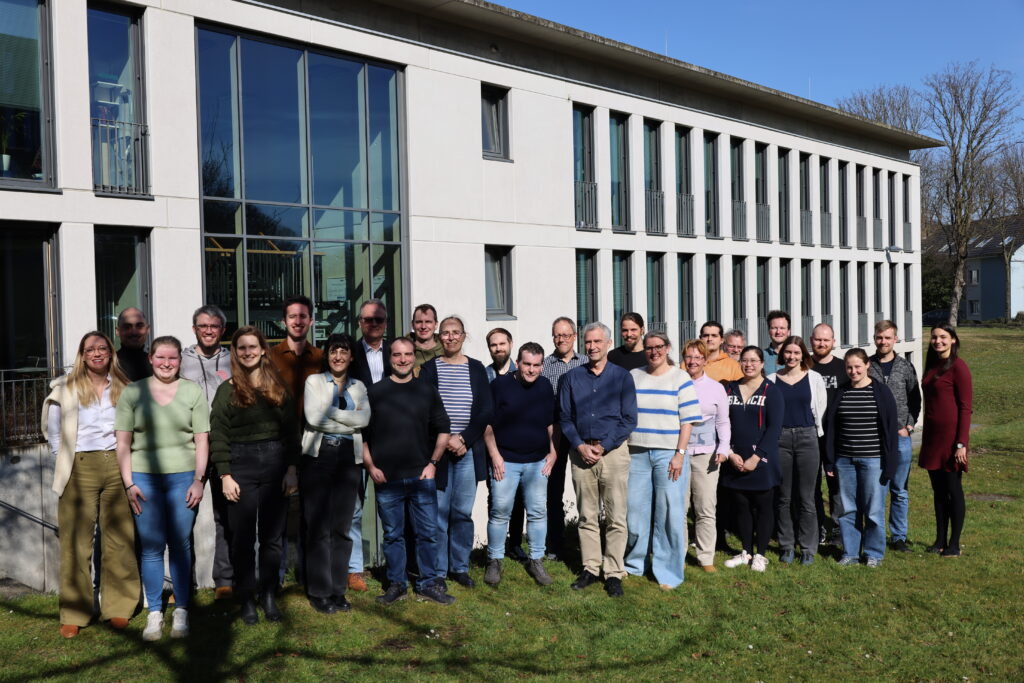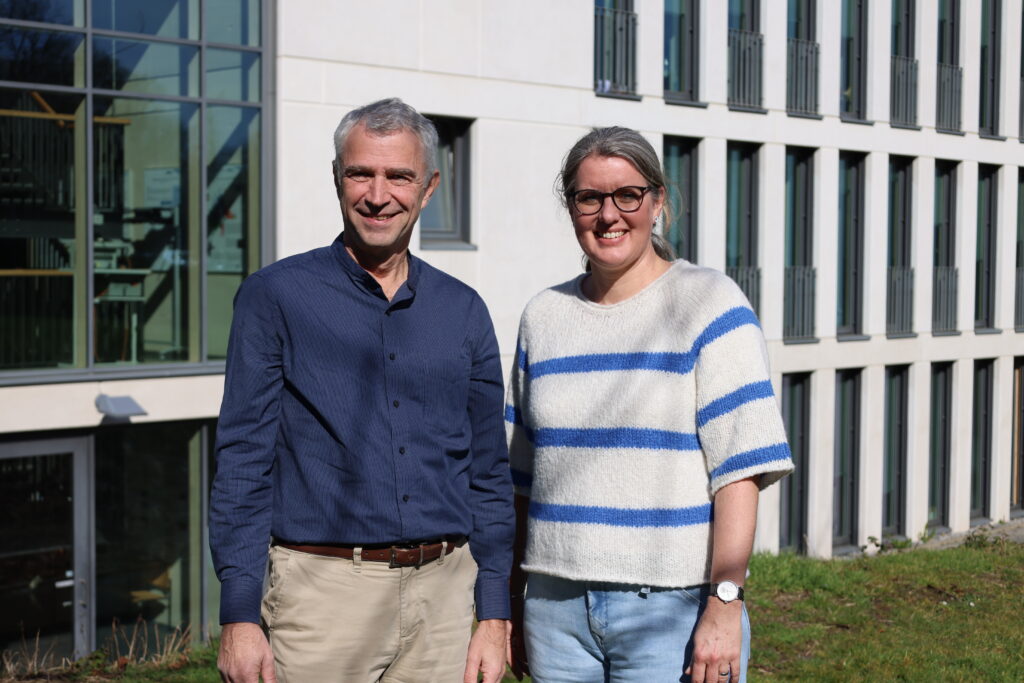Kategorie: ‘Events’
Einladung zur Abschlussveranstaltung des BaLSaM-Projekts am 21.1.2026
Das Projekt “Braunkohlereviere als attraktive Lebensräume durch Straßengeräuschsimulation auf Basis bestehender Verkehrsdaten zur Minimierung von Lärm” (BaLSaM) lädt Interessierte zur öffentlichen Abschlussveranstaltung ein. Sie wird am 21.1.2026 von 8:30-11:30 Uhr im Institut für Hörtechnik und Akustik (IHTA) der RWTH Aachen University stattfinden (Adresse: Kopernikusstraße 5, 52074 Aachen, Deutschland).
Im Rahmen des BaLSaM-Projekts wurde die Modellierung der Schallausbreitung von Verkehrslärm in urbanen Umgebungen sowie deren Auswirkung auf die menschliche Wahrnehmung untersucht. Das BaLSAM-Konsortium setzt sich zusammen aus dem Institut für Kraftfahrzeuge (IKA) und dem Institut für Hörtechnik und Akustik (IHTA) der RWTH Aachen University sowie RHA REICHER HAASE ASSOZIIERTE GmbH und HEAD acoustics GmbH. Gefördert wird das Projekt von dem Bundesministerium für Verkehr im Rahmen der mFUND-Initiative.
Während der Abschlussveranstaltung werden die Projektpartner die Ergebnisse des Projekts zu präsentieren. Darüber hinaus wird das Event die Gelegenheit bieten, Erfahrungen auszutauschen und gemeinsam über zukünftige Fragestellungen zu diskutieren. Neben der Teilnahme vor Ort ist auch eine digitale Teilnahme an der Veranstaltung möglich.
Agenda:
| 08:30 | Anreise |
| 09:00 | Begrüßung |
| 09:15 | Vorstellung des Projektes |
| 09:30 | Vorstellung der Ergebnisse aus den Arbeitspaketen |
| 11:00 | Diskussion mit dem Teilnehmerkreis |
| 11:15 | Beginn der Demo & Ausklang des öffentlichen Teils |
| Im Anschluss: Projekt-interner Abschluss (nicht öffentlich) | |
— English version —
The BaLSaM project invites interested parties to the public closing event. It will take place on January 21, 2026, from 8:30 a.m. to 11:30 a.m. at the Institute for Hearing Technology and Acoustics (IHTA) at RWTH Aachen University (address: Kopernikusstraße 5, 52074 Aachen, Germany).
The BaLSaM project investigated the modeling of traffic noise propagation in urban environments and its impact on human perception. The BaLSAM consortium consists of the Institute for Automotive Engineering (IKA) and the Institute for Hearing Technology and Acoustics (IHTA) at RWTH Aachen University, as well as RHA REICHER HAASE ASSOZIIERTE GmbH and HEAD acoustics GmbH. The project is funded by the German Federal Ministry of Transport as part of the mFUND initiative.
During the closing event, the project partners will present the results of the project. In addition, the event will provide the opportunity to exchange experiences and discuss future topics. In addition to attending in person, digital participation in the event is also possible.
—————
Anmeldung / Registration:
https://www.balsam-projekt.de/de/abschlussveranstaltung.html
Digitale Teilnahme per Teams / Online participation via Teams:
Jetzt an der Besprechung teilnehmen
Besprechungs-ID: 317 428 128 635 50
Passcode: zg6pV6Yw
Joint meeting of ASA and ASJ in Honolulu
From December 1st to December 5th, the sixth joint meeting of the Acoustical Society of America (ASA) and the Acoustical Society of Japan took place in Honolulu, Hawaii. This conference included more than 70 special sessions covering various areas of of acoustics research, presented either in lecture or poster format. In addition to Michael Vorländer’s role as the president of the ASA, the Institute was involved in three scientific contributions at this conference:
- Recent Trends and Perspectives on the Use and Characterization of Acoustic Materials (Ana Jaramillo, Daniel Robinson, Arthur van der Harten, Anne Heimes, Michael Vorländer)
- Boundary Admittance Measurement Method (Peter D’Antonio, Michael Vorländer, Markus Müller-Trapet)
- Voice regulation in two-person conversations in simulated acoustic environments (Manuj Yadav, Ella Manor, Densil Cabrera, Janina Fels, Michael Vorländer)
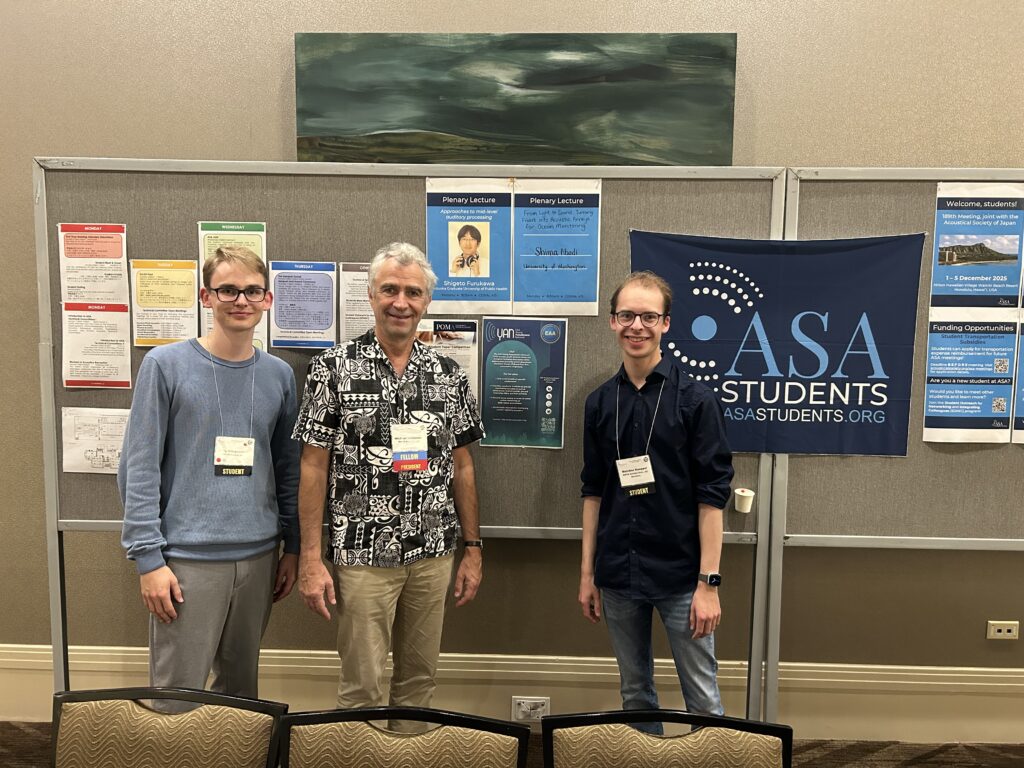
Also, IHTA students Filip Klingelnberg and Melchior Käppel attended their first international conference and represented the Young Acousticians Network (YAN) of the European Acoustics Association.
Flatterechos und Streuselbrötchen: Cosima Ermert gewinnt den Science Slam der RWTH
Im Rahmen der am 14.11.2025 stattgefundenen RWTH Wissenschatftsnacht „5 vor 12“ hatten beim Science Slam Interessierte (nach Voranmeldung) die Möglichkeit, ein wissenschaftliches Thema in lockerer und kreativer Art und Weise einem breitem Publikum in einem kurzen Vortrag von 5-8 Minuten vorzustellen. Neben fünf anderen Slammerinnnen und Slammern nahm dabei unsere Mitarbeiterin Cosima Ermert mit dem Beitrag „Flatterechos und Aachener Backwaren“ teil und zeigte, wie man Akustik anschaulich und unterhaltsam erklären kann. Basierend auf dem Applaus der fast 1000 Besucher*innen im großen Hörsaal der RWTH, wurde ihr Beitrag zum ersten Platz bei diesem Wettbewerb gekürt. Herzlichen Glückwunsch zu dieser beeindruckenden Leistung, Cosima!
Im Zentrum von Cosimas Slam stand die Frage: Können Aachener Streuselbrötchen als akustische Diffusoren gegen Flatterechos helfen? Messungen eines selbstgebackenen Riesenstreuselbrötchens und Simulationen an 3D Scans echter Streuselbrötchen – gemeinsam mit unserer Expertin für akustische Streuung, Anne Heimes – ergaben: Aufgrund ihrer Größe und Struktur streuen Streuselbrötchen vor allem Schallwellen hoher Frequenzen.
Um die Simulationen in unserem skalierten Hallraum zu valideren, braucht es jetzt nur noch ein echtes Streuselbrötchen mit einem Durchmesser von 80cm… Die Forschung an Aachener Spezialitäten ist also noch lange nicht vorbei!
Wir freuen uns über Cosimas Erfolg und sind schon gespannt auf weitere akustische Erklärungen mit Aachener Köstlichkeiten. Herzlichen Glückwunsch!
GfTA Alumni-Talks: Binauraltechnik am I(H)TA
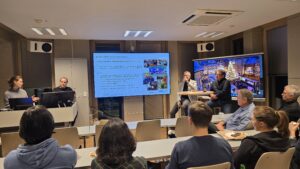
Lukas Aspöck und Cosima Ermert aus dem GfTA Vorstand stellen die beiden Sprecher vor.
Am 20. November 2025 fanden im Seminarraum des Instituts für Hörtechnik und Akustik zum zweiten Mal die GfTA Alumni-Talks statt.
Bei diesem Format, organisiert von der Gesellschaft für Technische Akustik e.V., soll der Austausch zwischen ehemaligen und aktuellen IHTAliener*innen gefördert und einen generationenübergreifenden Kontakt zwischen Mitarbeiter*innen ermöglicht werden.
In lockerer Atmosphäre werden dabei interessante Karrierewege in der Akustik beleuchtet und Anekdoten aus dem früheren Institutsleben ausgetauscht.
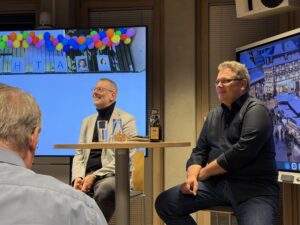
Alfred Schmitz (links) und Tobias Lentz (rechts)
Die beiden I(H)TA-Alumni Alfred Schmitz (bekannt durch den ITA Kunstkopf, nun bei TAC und Dozent im Intensivkurs Raumakustik) und Tobias Lentz (Mitentwickler am ersten CAVE-System der RWTH, nun Teamleiter in der Softwareentwicklung bei HEAD acoustics) berichteten von ihren Erfahrungen im Studium, der Promotion und der Zeit nach dem IHTA.
Anschließend wurde bei Glühwein und anderen Getränken die Gelegenheit genutzt, weitere Geschichten aus der damaligen und aktuellen Zeit am Institut auszutauschen. Der GfTA-Vorstand möchte sich für das große Interesse bei allen Zuhörer*innen und ganz herzlich bei Alfred und Tobias für ihre Beteiligung an dem Event bedanken.
3rd IHTA Retreat
The third IHTA Retreat took place on November 21st. The day began with unconventional yet exceptionally entertaining and informative project presentations with an amazing view of Aachen from the Skylounge in the main building. Participants were challenged to present their projects either as a short, powerful science pitch or in a creative way. We heard short stories about children’s hearing experiences in classrooms and saw theater plays with the inner, middle, and outer ears as the main characters. There will surely be many new contestants for Research in Shorts at DAGA 2026.
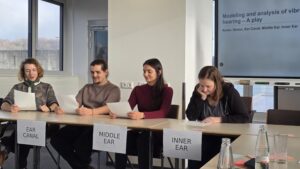
During the afternoon, we discussed challenges related to writing and publishing scientific papers, as well as strategies for overcoming them. Most importantly, we took time to learn from one another, develop new inspiration, and take the first steps to overcome writer’s block and support each other.
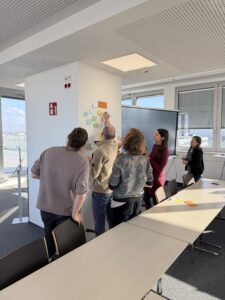
Thank you to Bastian Hughes for guiding us through the day with his excellent moderation! Thanks also to Julia Seitz, Lara Stürenburg, and Carolin Breuer, who organized the event.
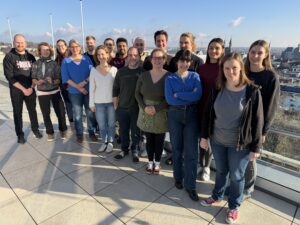
University Observation Week (Hochschulhospitationswoche) Electrical Engineering at IHTA
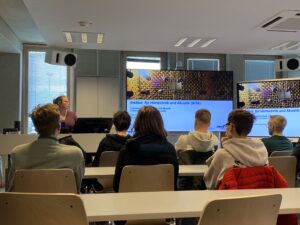
On November 6, 2025, the IHTA welcomed prospective students as part of the Electrical Engineering University Observation Week (Hochschulhospitationswoche). The tour through the world of acoustics began with an inspiring video and then introduced the participants to the diverse field of acoustics at IHTA.
Afterwards, the participants then went through three hands-on stations:
- Aliasing
- Binaural hearing – spatial hearing
- Audiometry
The experiments offered a vivid insight into key issues in hearing technology and acoustics.
Many thanks to Jana Berger, Hark Braren, and Carolin Breuer for supervising the stations.
The IHTA would like to thank the participants for their interest and enthusiasm, and looks forward to seeing some familiar faces in upcoming semesters.
DAGA 2026 Travel Grants
Die Gesellschaft für Technische Akustik (GfTA e.V.) möchte Studierende des IHTAs unterstützen an der kommenden Jahrestagung für Akustik DAGA 2026 teilzunehmen. Diese von der deutschen Gesellschaft für Akustik (DEGA) organisierten Konferenz findet vom 23. bis zum 26. März 2026 in Dresden statt. Die Tagung bietet eine spannende Möglichkeit, erste Erfahrungen bei wissenschaftlichen Konferenzen zu sammeln.
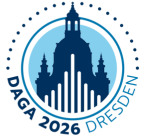
Die GfTA fördert in diesem Jahr Studierende mit einen Reisezuschuss (Travel grant) in Höhe von jeweils 200-300 €. Kandidat*innen müssen keinen wissenschaftlichen Beitrag bei der Konferenz einreichen, sollten aber zuvor noch keine DAGA-Konferenz besucht haben und an mind. einer Lehrveranstaltung am IHTA teilgenommen oder eine Abschlussarbeit angefertigt haben / aktuell anfertigen. Die Registierungsgebühr für die Konferenz entfällt für Studierende bei Erstteilnahme (für die ersten 50 Anmeldungen, grauer Kasten auf der rechten Seite der Website – „Schnupperangebot für Studierende“, Beitragsklasse 8 bei Anmeldung.).
Um Dich für diesen Travel Grant zu bewerben, schreibe eine Email an Lukas Aspöck und erkläre in ein oder zwei Sätzen, warum Du motiviert bist an einer Akustik-Konferenz teilzunehmen. Die Deadline für Bewerbungen ist der 05.12.2025, die Bekanntgabe findet bei der IHTA-Weihnachtsfeier am 19.12.2025 statt.
Climbing Challenges and Hungry Hikes
Once again, it was that time of year when the IHTA sets off on new adventures. And what an adventure it was! It began high up in the treetops, where just a few small, wobbly wooden platforms separated the IHTA colleagues from the distant forest floor. Courageously many parcours were mastered, some of which even included manoeuvring a scooter over a wooden bridge or swinging heroically into a spider-like web. The final section was a platform at lofty heights, with no other way but forward into the depths below. Fortunately, a leap of faith proved that a braking device was in place, ensuring a smooth descent for everyone.
After this, a forest hike seemed like just the thing to calm the nerves and enjoy nature from a more familiar viewpoint. In beautiful sunshine, the walk was made towards the institute, enjoying the soundscape and adding some cheerful chattering to it.
Certainly hungry after all this activity, a great and well-deserved barbecue was enjoyed at the Institute, and let the day come to a peaceful end.
In this spirit, a big thank you to all the IHTA members who were involved in organising this excursion and who made this wonderful day possible.
IHTA beim Internationalen Workshop zu „Lärm im Klassenraum: Aktuelles aus der Forschung“ in Padua
Am 12. September 2025 fand im Archivio Antico im Palazzo Bo der Universität Padua ein Workshop zum Thema „Klassenraumakustik und Lärm” (International Workshop „Classroom Noise: A Research Update”) statt.
Der Workshop zielte darauf ab, den Dialog zwischen Expert*innen in der Forschung und Fachleuten zu fördern, die sich mit Lärm in schulischen Umgebungen und dessen Auswirkungen auf Schülerinnen und Schüler sowie Lehrkräfte befassen.
Die Veranstaltung umfasste Beiträge nationaler und internationaler Experten zu Themen, die von den kognitiven Auswirkungen von Lärm auf das Lernen und das Wohlbefinden in Klassenzimmern bis hin zum Wohlbefinden von Lehrkräften und den Erfahrungen von Schülerinnen und Schülern mit sonderpädagogischem Förderbedarf reichten.
Den Abschluss des Tages bildete eine Podiumsdiskussion über Instrumente und Methoden zur Bewertung der Leistungen von Kindern unter lauten Bedingungen.
Dieser Workshop war Teil einer umfassenderen multidisziplinären Initiative zur Verbesserung der Qualität von Lernumgebungen, an der Expert*innen aus den Bereichen Akustik, Psychologie, Neurowissenschaften und Pädagogik beteiligt sind.
Janina Fels präsentierte die neuesten Forschungsergebnisse des Instituts für Hörtechnik und Akustik (IHTA). Diese beschäftigen sich mit dem Einfluss von Akustik und Lärm in Klassenzimmern auf Höranstrengung und Aufmerksamkeit bei Kindern. Die Ergebnisse basieren auf dem Einsatz von akustischer und audiovisueller virtueller Realität, mit dem Ziel, dass realitätsnahe und gleichzeitig gut kontrollierbare Studien durchgeführt werden können.
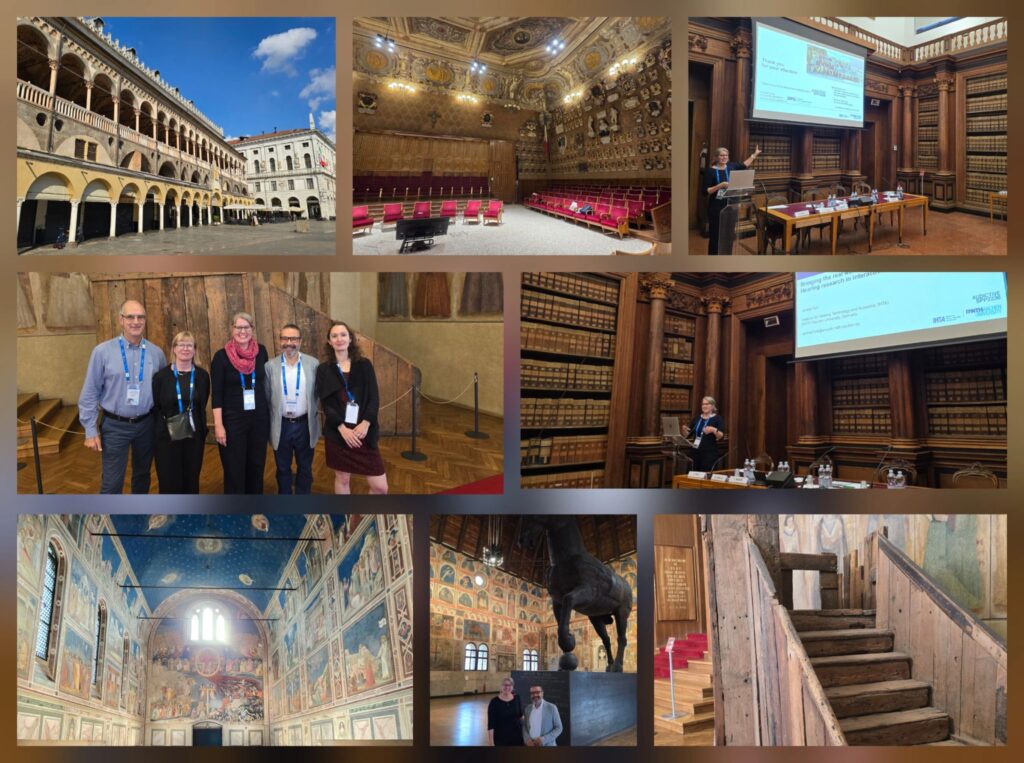
Herbstworkshop des Schwerpunktprogramms AUDICTIVE
Wir blicken auf einen sehr erfolgreichen und gelungenen Herbstworkshop des AUDICTIVE-Schwerpunktprogramms zurück.
Mehr als 30 Mitglieder des Schwerpunktprogramms AUDICTIVE „Auditory Cognition in Interactive Virtual Environments” www.spp2236-audictive.de – darunter leitende Wissenschaftler*innen und Doktorand*innen – nahmen am diesjährigen Workshop am Institut für Hörtechnik und Akustik in Aachen vom 31. August – 2. September 2025 teil.
Das Programm begann mit zwei interessanten Keynote-Vorträgen: Inga Holube sprach über „Ecological Momentary Assessment” und Stephan Getzmann gab Einblicke in „Healthy Aging, Auditory Distraction, and Multi-Speaker Speech Perception — Insights from the Dortmund Vital Study”.
Während der 1,5 Tage des Workshops wurden in Posterpräsentationen die Fortschritte und nächste Schritte in den geförderten 9 interdiszplinären Projekten vorgestellt.
Anschließend folgten Diskussionen und weitere Schritte in bestehenden Arbeitsgruppen sowie die Planung neuer gemeinsamer Aktivitäten zur Förderung des interdisziplinären Projektaustauschs.
Es wird erwartet, dass die Erkenntnisse aus AUDICTIVE die Virtual- und Augmented-Reality-Technologien voranbringen werden, bei denen Akustik eine Schlüsselkomponente für die nutzerzentrierte Anwendungsentwicklung und -gestaltung ist, wie beispielsweise immersive Telekonferenzen, Gesundheitsförderung, Rehabilitation und Assistenzsysteme für Nutzer*innen mit besonderen Bedürfnissen.
AUDICTIVE – SPP2236 wird von der Deutschen Forschungsgemeinschaft (DFG) gefördert.

Schnupperuni Ingenieurwissenschaften für Schülerinnen am IHTA
Am 31. Juli 2024 begrüßte das Institut für Hörtechnik und Akustik Teilnehmerinnen der Schnupperuni Ingenieurwissenschaften für Schülerinnen. Nach einer Einführung in das Studium der Elektrotechnik und einer Vorstellung des Instituts berichtete eine Mitarbeiterin aus ihrem Studien- und Berufsweg.
Anschließend durchliefen die Schülerinnen in Kleingruppen vier Hands-On-Stationen:
- Lego-Lautsprecher
- Audiometrie
- Absorptionsgradmessung & Raumakustik-Simulationen
- IHTA-Park in Virtueller Realität
Die Experimente boten einen anschaulichen Einblick in zentrale Fragestellungen der Hörtechnik und Akustik und des Studiums der Elektrotechnik.
Danke an Julia Seitz, Lara Stürenburg und Cosima Ermert für die Stationen und an Karin Loh für die Organisation der Veranstaltung!
Das IHTA bedankt sich außerdem bei den Teilnehmerinnen für ihr Interesse und wünscht ihnen weiterhin viel Erfolg bei ihrer Studienorientierung.
Weitere Informationen zur Schnupperuni auf der Website der RWTH.
- Begrüßung Schülerinnenuni 2025
- In der Hörkabine
- Audiometrie
- Lego Lautsprecher
- Absorbermaterialien
- Raumakustische Messungen
- Im VR Labor
IHTA-Damenteam holt sich den Turniersieg beim 26. Fußballturnier der Fakultät für Elektrotechnik und Informationstechnik
Bei strahlendem Sonnenschein fand am 11. Juli 2025 das 26. Fußballturnier der Fakultät für Elektrotechnik und Informationstechnik der RWTH Aachen bei der DJK Westwacht statt.
Das IHTA war diesmal mit vielen Spielerinnen und Spielern dabei und stellte sowohl ein Männer- als auch ein Damenteam.
Insgesamt kämpften drei Damenteams und 16 Männerteams um den Turniersieg.
Zum ersten Mal in der Geschichte des IHTA konnte sich dabei das Damenteam den Turniersieg sichern!
Das Männerteam belegte einen hervorragenden 8. Platz.
Herzlichen Glückwunsch an alle IHTA-Spieler*innen und vielen Dank an alle Mitarbeiter*innen, die die Teams außerhalb des Spielfelds unterstützt haben.
Project Kick-off: SWOISE – UAS Swarms for Noise Reduction
Unmanned aerial systems (UAS), such as drones, are becoming increasingly popular for wide range of applications, ranging from delivery and mapping to surveillance. The emergence of the UAS swarm systems, where multiple UAS operate in coordinated formations, might offer advantages regarding improved efficiency and reduced logistical effort. However, UAS swarms also raise concerns about noise pollution, especially in urban environments. The SWOISE project aims to address this issue by investigating the noise generated by drone swarms, how it is perceived by humans, and how swarm configurations can be optimized to minimize acoustic impact. Within the project, the task of IHTA is to focus on the psychoacoustic analysis of UAS swarm noise by creating binaural sound samples using simulations of urban overflights, and analyzing them through perceptual and objective evaluations. This research will be mostly carried out by our post doctoral researcher Jithin Thilakan, who recently joined our team.
SWOISE is funded by the German aviation research program LuFo VI-3 and brings together four research partners:
- Institute of Air Transport Systems (ILT), TU Hamburg (Prof. Dr.-Ing. Volker Gollnick)
- Chair of Flight Guidance and Air Traffic, TU Berlin (Prof. Dr. ir. Maarten Uijt de Haag)
- Institute for Hearing Technology and Acoustics (IHTA), RWTH Aachen University (Prof. Dr.-Ing. Janina Fels)
- German Aerospace Center (DLR Hamburg: Institute of Air Transport – associate partner)
The project officially launched with a kick-off meeting on July 8th, 2025, at TU Hamburg, where researchers from all partner institutions gathered to discuss the research plans and future steps. We look forward to advancing this collaborative effort and contributing towards quieter and more environment-friendly aviation.

The SWOISE research team at the official kick-off meeting at TU Hamburg
IHTA at Forum Acusticum Euronoise 2025 in Malaga
At the end of last month, the scientific conference Forum Acusticum Euronoise successfully took place in Malaga, Spain, organized by members of the Spanish Acoustics Society (SEA). Across four days, a total number of 1250 delegates participated and presented interesting research results in the field of acoustics and noise, accompanied by an engaging social program. The Institute for Hearing Technology and Acoustics was represented by Lukas Aspöck and our former colleague Marco Berzborn, who altogether organized three technical sessions and contributed to five papers:
- Marco Berzborn and Michael Vorländer: Stochastic Variational Inference of Directional Decay Times in a Reverberation Room
- Lukas Aspöck, Michael Vorländer and Janina Fels: Rendering complex acoustic scenes for perception experiments
- Marco Berzborn and Michael Vorländer: Analysis of the relationship between sound field isotropy and errors in the results of Sabine’s absorption coefficient
- Lukas Aspöck, Pascal Palenda, Janina Fels and Michael Vorländer: Application of room acoustics simulation software in university teaching
- Fabian Brinkmann, Marco Berzborn, […] Anne Heimes, Simon Kersten, Pascal Palenda et al.: Open educational resources for acoustics and audio signal processing using Jupyter notebooks and pyfar
- Entrance of conference venue in Malaga
- Opening on Monday: Plenary lecture on underwater sounds by Ana Sirovic
- IHTA alumni group picture
- Marco Berzborn during one of this presentation
Michael Vorländer tritt in den Ruhestand ein
Nach einer langjährigen Phase intensiver Forschung im Bereich der akustischen virtuellen Realität und der technischen Akustik ging Michael Vorländer am 28. Februar 2025 nach fast 30 Jahren als Professor für Technische Akustik an der Rheinisch-Westfälischen Technischen Hochschule (RWTH) Aachen offiziell in den Ruhestand.
Trotzdem ist er weiterhin aktiv an laufenden Projekten und Dissertationen am Institut für Hörtechnik und Akustik (IHTA) der RWTH Aachen beteiligt. Darüber hinaus wird Vorländer neben seinen Beiträgen zur Akustik-Community auf nationaler Ebene auch weiterhin eine aktive Rolle auf internationaler Ebene spielen, und zwar als Präsident der Acoustical Society of America von Mai 2025 bis Mai 2026.
Heute haben wir ihn im IHTA mit einer kleinen internen Abschiedsfeier und einem goldenen Doktorhut verabschiedet. Michael Vorländer hat der Akustik-Community, insbesondere dem IHTA, einen bedeutenden Beitrag geleistet!
Wir danken ihm von Herzen für seine Arbeit und wünschen ihm für seinen neuen Lebensabschnitt alles Gute.
- Abschiedsworte
- Goldener Doktorhut
- IHTA Team
- IHTA Leitung
IHTA Contributions to DAS|DAGA 2025
This year’s DAS|DAGA 2025 is the joint annual meeting of the Danish and German Acoustical Societies (DAS and DEGA). The conference takes place in Copenhagen from 17th to 20th of March, 2025. As usual, IHTA members will present their work on the plethora of research topics covered at IHTA. This year, the IHTA is involved in a total of 23 contributions. In addition, the IHTA has been very active in organizing special sessions and events (see below).
We are happy to invite you to our presentations and posters!
You can find the full conference program in the DAS|DAGA Web-App. Every contribution in the table below links to its entry in the web-app, where you can read its abstract and add it to your personal conference schedule.
We are looking forward to meet you there!
| Monday, March 17 | ||||
| Simon Kersten, Michael Vorländer | Physical Mechanisms Underlying the Occlusion Effect | Precolloquium: Hearing Acoustics: Models, algorithms and applications | 12:25 | Room 20 |
| Tuesday, March 18 | ||||
| Rouben Rehman, Simon Kersten, Janina Fels | An Experimental Setup for the Estimation and Emulation of Bone and Air Conducted Components of One’s Own Voice | Methods for Technical and Perceptual Evaluations of Hearing Devices 1 | 14:20 | Room 19 |
| Kristin Ohlmann, Simon Kersten, Michael Vorländer, Birger Kollmeier | Perceptual Estimation of the Bone Conduction Path for One’s Own Voice | Psychoacoustics (Poster) | 15:20 | Hall E, Poster Island H |
| Cornelius Frankenbach, Carsten Herzog, Julia Seitz, Janina Fels | Comparing Localization Accuracy With Generic, Estimated, and Individual HRTFs Using Dynamic Binaural Synthesis | Binaural Technologies | 16:40 | Room 5 |
| Julia Seitz, Janina Fels | A Questionnaire Suitable to Assess Listening Effort in Children and Adults | Noise Effects in Children | 17:40 | Hall B - Sydhavn (B4M4) |
| Wednesday, March 19 | ||||
| Nils Rummler, Gülnihan Atay, Josep Llorca-Bofí, Michael Vorländer | RAVEN Benchmark Using the Loudspeaker Orchestra | Virtual Acoustics 2 | 8:40 | Room 5 |
| Lara Stürenburg, Lukas Aspöck, Janina Fels | Investigating the Perception of a Heat Pump in Different Audio-Visual Settings | Effects of Noise & Noise Policy | 10:00 | Hall B - Sydhavn (B4M4) |
| André Kruh-Elendt, Christian Laufs, Jonas Heck, Janina Fels, Moritz Lippold, Christoph Klanten, Andreas Herweg | Evaluation of Stress in Response to Traffic Noise Using Virtual Reality | Effects of Noise & Noise Policy | 10:20 | Hall B - Sydhavn (B4M4) |
| Thomas Deutsch, Luigi Falanga, Iring Koch, Janina Fels | Spatial Release From Masking With and Without Simulated Hearing Loss: Comparison of Different Spatial Audio Reproduction Methods | Audiological and Medical Acoustics | 11:00 | Room 19 |
| João Fatela, Anne Heimes, Michael Vorländer | Efficient Acoustic Radiosity Modelling for Precise Bi-directional Reflectance Distribution Patterns | Virtual Acoustics 2 | 11:20 | Room 5 |
| Marco Berzborn, Michael Vorländer | Stochastic Inference of Directional Decay Times in a Reverberation Room | Room Acoustics 2 | 15:00 | Aud 15 |
| Lukas Aspöck, Chalotorn Möhlmann, Philipp Schäfer, Hanna Potulski, Vanessa Overhage, Thomas Gries, Christa Reicher, Janina Fels | Acoustic Simulation and Auralizations to Investigate the Impact of Textile Building Façades in Urban Environments | Effects of Noise & Noise Policy (Poster) | 15:20 | Hall E, Poster Island D |
| Gülnihan Atay, Josep Llorca-Bofí, Michael Vorländer | Audio-Visual Perception of Loudness in Concert Halls | Room Acoustics (Poster) | 15:20 | Hall E, Poster Island B |
| Manan Lamba, Simon Kersten, Stephan D. Ewert, Michael Vorländer, Birger Kollmeier | Perceived Level Differences at Equal Loudness in Headphone-Based Comparisons of Virtual Room Acoustics and Diotic Stimuli | Room Acoustics (Poster) | 15:20 | Hall E, Poster Island B |
| Alexander Raake, Stephan Fremerey, Carolin Breuer, Larissa Leist, Maria Klatte, Janina Fels | Evaluation of Audiovisual Scene Analysis in Virtual Reality Classroom Scenarios | AUDICTIVE 1 - Auditory Cognition in Interactive Virtual Environments | 16:20 | Room 6+7 |
| Carolin Breuer, Larissa Leist, Stephan Fremerey, Alexander Raake, Maria Klatte, Janina Fels | Exploring the Impact of Room Acoustics on Auditory Selective Attention | AUDICTIVE 1 - Auditory Cognition in Interactive Virtual Environments | 17:40 | Room 6+7 |
| Thursday, March 20 | ||||
| Cosima A. Ermert, Jonathan Ehret, Chinthusa Mohanathasan, Andrea Bönsch, Torsten W. Kuhlen, Sabine J. Schlittmeier, Janina Fels | Influence of (Non) Intelligible Background Speech on Memory and Listening Effort in Conversational Situations | AUDICTIVE 2 - Auditory Cognition in Interactive Virtual Environments | 8:40 | Room 6+7 |
| Lukas J. Vollmer, Leonie Schmitz, Karin Loh, Janina Fels | Cue-Related Evoked Potentials Capture Auditory Attention Switches | AUDICTIVE 2 - Auditory Cognition in Interactive Virtual Environments | 9:20 | Room 6+7 |
| Pascal Palenda, Christoph Kirsch, Stephan D. Ewert, Michael Vorländer | Validation of a Simplified Higher-Order Diffraction Model in Urban Environments | Outdoor Sound Propagation 1 | 9:20 | Hall B - Nørrebro (B3M1) |
| Christoph Kirsch, Pascal Palenda, Michael Vorländer, Stephan D. Ewert | A Toolbox for Filter-Based First- and Higher-Order Edge Diffraction Modeling | Outdoor Sound Propagation 1 | 9:40 | Hall B - Nørrebro (B3M1) |
| Moritz Bender, Jamilla Balint, Janina Fels | A Study on Voice Quality and Vocal Fatigue of Lecturers in Lecture Halls | Speech Processing 1 | 10:40 | Room 19 |
| Anne Heimes, Densil Cabrera, Michael Vorländer | Determination of Bidirectional Scattering Coefficients From Measured Scattering Patterns | Outdoor Sound Propagation 2 | 14:00 | Hall B - Nørrebro (B3M1) |
| Chalotorn Möhlmann, Lukas Aspöck, Janina Fels | Auralization of Vehicle Pass-By Using Impulse Responses of Dynamic Urban Environments | Outdoor Sound Propagation 2 | 15:20 | Hall B - Nørrebro (B3M1) |
| Jonas Heck, Josep Llorca-Bofí, Michael Vorländer, Janina Fels | Efficient Modeling of Urban Traffic Scenarios for Virtual Reality | Virtual Acoustics 3 | 15:40 | Room 5 |
| Organized Sessions | ||||
| Noise Effects in Children | Julia Seitz, Kerstin Persson Waye | Tuesday, 18.03.2025 | 16:00 - 18:20 | Hall B - Sydhavn (B4M4) |
| AUDICTIVE 1 - Auditory Cognition in Interactive Virtual Environments | Janina Fels, Carolin Breuer | Wednesday, 19.03.2025 | 16:00 - 18:00 | Room 6+7 |
| AUDICTIVE 2 - Auditory Cognition in Interactive Virtual Environments | Thursday, 20.03.2025 | 08:40 - 11:00 | ||
| Junge DEGA Events | ||||
| Icebreaker | junge DEGA Jonas Heck, Tabea Breitkreutz, Lara Stürenburg | Monday, 17.03.2025 | 15:00 - 16:00 | Balcony 1, in front of Auditorium 10-12 (Plenary hall) |
| Pub night | Monday, 17.03.2025 | 20:00 - 23:00 | The Moose (Sværtegade 5, 1118 København K) | |
| Speed Dating — Meet the Acousticians | Tuesday, 18.03.2025 | 17:40 - 18:20 | Hall B - Nordhavn (B3M10) | |
| Research in short(s) & Power-Point-Karaoke | Wednesday, 19.03.2025 | 16:00 - 17:20 | Room 20 | |
| Mentoring-Café | Wednesday, 19.03.2025 | 17:20 - 18:00 | Room 18 | |
| Other Events | ||||
| Frauen@DEGA Meeting | Karin Loh, Cleopatra Christina Moshona | Thursday, 20.03.2025 | 12:30 - 14:00 | Room 5 |
| Hands-On Workshop: PYFAR - Python Packages for Acoustics Research | IHTA (RWTH Aachen University), Audio Communication Group (TU Berlin), Department of Engineering Acoustics (TU Berlin), Institute of Communications Engineering (TH Köln) | Thursday, 20.03.2025 | 12:30 - 14:00 | Room 6+7 |
GfTA Studienpreise 2024 für Matthias Tillmann und Rouben Rehman
Auf der Weihnachtsfeier des IHTA wurde von der Gesellschaft für Technische Akustik e.V. (GfTA) je ein Preis für eine herausragende Bachelorarbeit und eine herausragende Masterarbeit vergeben. Die Preisträger sind dieses Jahr Matthias Tillmann und Rouben Rehman. Wir sagen natürlich herzlichen Glückwunsch!
- Matthias Tillmann
Bachelorarbeit zum Thema: „Der Einfluss realistischer audiovisueller Störquellen auf die selektive auditive Aufmerksamkeit“ im Lehrstuhl für Hörtechnik und Akustik betreut durch: Carolin Breuer und Janina Fels - Rouben Rehman
Masterarbeit zum Thema: “Vergleich von VR- und webbasierten Hörexperimenten zur Wahrnehmung in komplexen auralisierten Umgebungen” im Lehrstuhl für Technische Akustik betreut durch Josep Llorca-Bofi und Michael Vorländer
- Beste Bachelorarbeit: Preisträger Matthias Tillmann mit Lukas Aspöck, Foto: Janina Fels
- Beste Masterarbeit: Preisträger Rouben Rehman mit Lukas Aspöck, Foto: Janina Fels
GfTA Alumni Talks: Unternehmensgründung in der Akustik
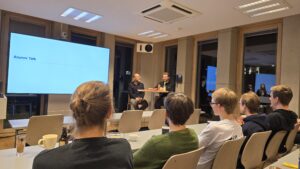
GfTA Alumni Talks, Foto: Janina Fels
Am 05.12. fanden am IHTA zum ersten Mal die GfTA-Alumni Talks statt. Dieses neue Format der GfTA soll den Austausch zwischen ehemaligen und aktuellen IHTAliener*innen fördern und einen generationenübergreifenden Austausch zwischen Mitarbeiter*innen ermöglichen.
In lockerer Atmosphäre werden interessante Karrierewege in der Akustik beleuchtet.
Dieses Mal stand die Selbstständigkeit im Mittelpunkt: Die beiden IHTA-Alumni und Firmengründer Roman Scharrer (KLANG:technologies) und Michael Makarski (Four-Audio und IFAA) berichteten von ihren Erfahrungen im Studium, der Promotion und der Unternehmensgründung.
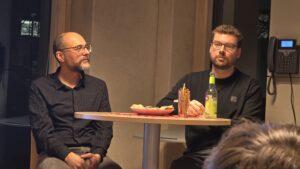
Michael Makarski (links) und Roman Scharrer (rechts) berichten von ihrer beruflichen Laufbahn. Foto: Janina Fels
Anschließend gab es bei Glühwein und Kinderpunsch noch reichlich Gelegenheit, Geschichten aus der damaligen und aktuellen Zeit am Institut auszutauschen. Besonders gefreut haben wir uns über den hohen Anteil an Studierenden im Publikum!
Im Namen des GfTA-Vorstandes möchten wir uns ganz herzlich bei Roman und Michael für diese Möglichkeit bedanken! Wir freuen uns schon auf die nächsten GfTA-Alumni-Talks im kommenden Jahr.
DAGA 2025 Travel Grants
Die Gesellschaft für Technische Akustik (GfTA e.V.) möchte Studierende des IHTAs unterstützen an der kommenden Jahrestagung für Akustik (DAS / DAGA 2025) teilzunehmen. Diese wird 2025 gemeinsam von der dänischen Akustikgesellschaft (Danish Acoustical Society – DAS) und der deutschen Gesellschaft für Akustik (DEGA) organisiert und findet vom 17. bis zum 20. März 2025 in Kopenhagen statt. Die Konferenz bietet eine sehr spannende Möglichkeit, erste Erfahrungen bei wissenschaftlichen Konferenzen zu sammeln.
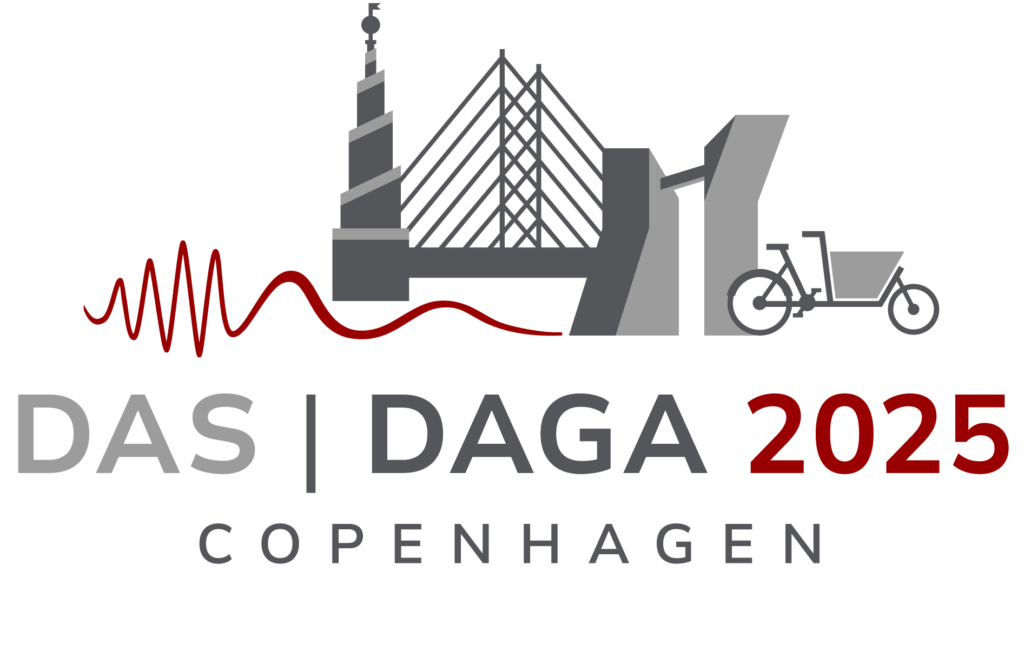 Die GfTA fördert in diesem Jahr zwei Studierende mit einen Reisezuschuss (Travel grant) in Höhe von jeweils 300 €. Kandidat*innen müssen keinen wissenschaftlichen Beitrag bei der Konferenz einreichen, sollten aber zuvor noch keine DAGA-Konferenz besucht haben und an mind. einer Lehrveranstaltung am IHTA teilgenommen oder eine Abschlussarbeit angefertigt haben / aktuell anfertigen. Die Registierungsgebühr für die Konferenz entfällt für Studierende bei Erstteilnahme (für die ersten 50 Anmeldungen, siehe ’special student offer‘ auf der Website).
Die GfTA fördert in diesem Jahr zwei Studierende mit einen Reisezuschuss (Travel grant) in Höhe von jeweils 300 €. Kandidat*innen müssen keinen wissenschaftlichen Beitrag bei der Konferenz einreichen, sollten aber zuvor noch keine DAGA-Konferenz besucht haben und an mind. einer Lehrveranstaltung am IHTA teilgenommen oder eine Abschlussarbeit angefertigt haben / aktuell anfertigen. Die Registierungsgebühr für die Konferenz entfällt für Studierende bei Erstteilnahme (für die ersten 50 Anmeldungen, siehe ’special student offer‘ auf der Website).
Um Dich für diesen Travel Grant zu bewerben, schreibe eine Email an Lukas Aspöck und erkläre in ein oder zwei Sätzen, warum Du motiviert bist an einer Akustik-Konferenz teilzunehmen. Die Deadline für Bewerbungen ist der 11.12.2024, die Bekanntgabe findet bei der IHTA-Weihnachtsfeier am 13.12.2024 statt.
Aachen Acoustics Colloquium 2024
Currently the 15th Aachen Acoustics Colloquium is taking place at Parkhotel Quellenhof in Aachen. This year’s scientific program includes 26 interesting contributions (2 Keynotes, 18 presentations and 6 poster presentations) about current research within the area of automotive acoustics, accompanied by a technical exhibition from various companies and research institutes. A detailed overview of the program can be found in this PDF.
Our institute is part of the organizing team of this event, which is attended by around 190 persons (~170 in-person and 22 online). On Tuesday morning, Michael Vorländer chaired the session „Infotainment in the vehicle“ including a very interesting keynote presentation by Hermann Ney on the current progress in speech and language technology. In the following session about numerical methods and simulations, our research assistant Christian Dreier held a presentation titled „Speed-dependent directivity patterns of road traffic sound sources“.
Additionally at the exhibition, our Institute presented current progress of research projects, e.g., the BalSaM project, in form of interactive demonstrations.
- Hosting team of the AAC: Lutz Eckstein (ika), Klaus Genuit (HEAD acoustics), Michael Vorländer (IHTA) and Stefan Pischinger (fev). Photo: Stefan Hense.
- Christian Dreier during his presentation. Photo: Stefan Hense.




